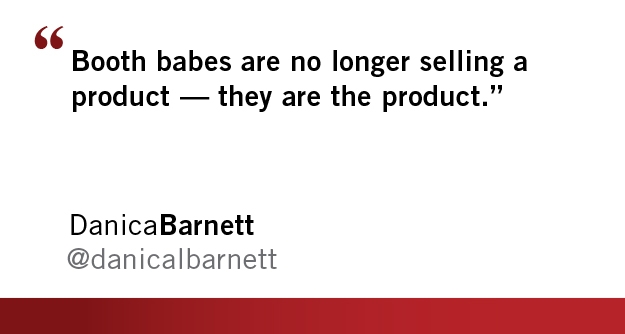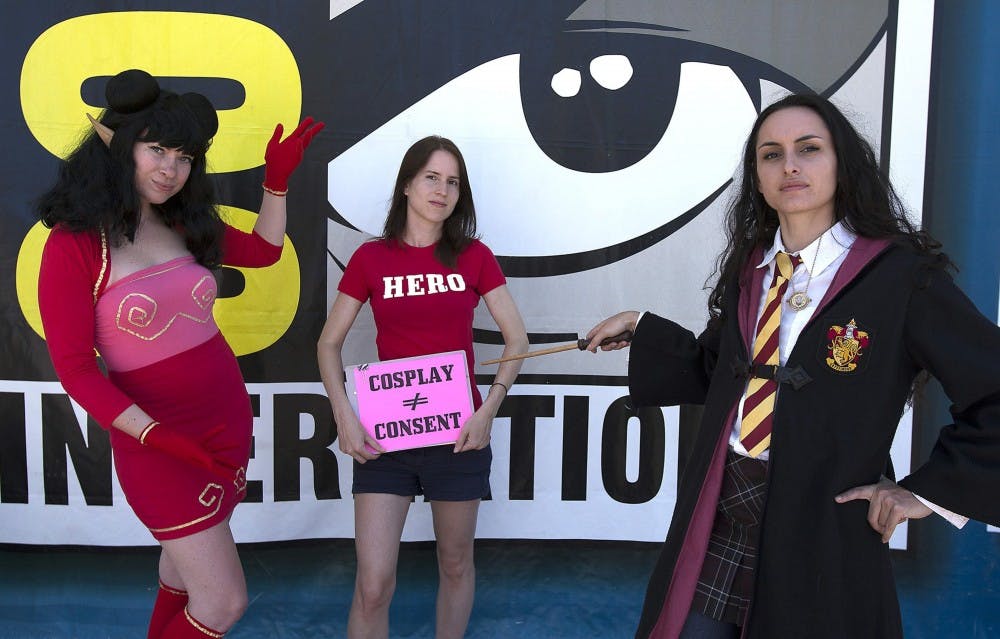"Booth babes" are becoming a thing of the past. These “promotional models” (the politically correct term for women who are hired to dress scantily and showcase a product) are in danger of being completely banned from events. The most recent banning has come from Auto Shanghai 2015, which hoped to place the focus of the nine-day event on the latest from car manufacturers rather than the women standing beside them.
Auto Shanghai 2015's ban follows in the footsteps of similar bans at PAX and the RSA Conference. When PAX, the Penny Arcade eXpo, announced its ban in 2012, it was met with the anger of sexually-repressed men everywhere. PAX, like any gaming convention, is known as a male-gamer haven where players can try out the latest release while a hired sex goddess stands beside them to applaud how well they do on the demo level. The exception to the new rule is cosplayers dressed as playable in-game characters, within reason.
Unfortunately, most female characters in video games and comics are designed to be sexually attractive, making it hard to find any PG canon cosplays. During the first year of PAX’s booth babe ban, cosplayer Jessica Nigri was asked to leave the PAX East show floor in her portrayal of "Lollipop Chainsaw’s" Juliet Starling in a hot-pink jumpsuit with a plunging neckline. Banning “inappropriate” outfits at big events like PAX is a way to change the way female characters are portrayed. Cosplaying has become a big marketing tool, and if a character is deemed too sexy for an event, gaming companies and comic book publishers are going to take a hit.

Events like Auto Shanghai and the RSA Conference, one of the biggest security conferences in the nation, were started for industry professionals. They were a chance to see the announcement of new products and learn more about your field. The people at the booths were industry experts who dressed in either business attire or a promotional shirt. Somehow, the environment shifted, and women became "booth babes." In booty shorts and a low-cut shirt, they were asked to stand around the merchandise and look pretty. Booth babes were no longer selling a product — they were the product.
Since then, booth babes have become a roadblock for women in technology. The RSA conference boasts the shocking statistic that women make up only 11 percent of the information technology field, a challenging industry for women to succeed in. Along with its ban on booth babes, the RSA Conference hosted an Executive Women’s Forum Reception to address women’s participation in the workforce. Banning booth babes is a step in the right direction to stop demeaning female industry experts with the use of hired women as sexual props.
It’s rare to find a “booth bro,” a male hired to do the job of a booth babe. Wise Guys Events rolled them out in 2013 as a social commentary on the use of women as promotional objects for games. Male models were hired to be objectified as game pieces in a physical trivia quiz, E3GoMania. Although "Magic Mike" has taught us that androphilics respond equally to having an attractive man dangled in front of them, conventions still market specifically to those attracted to females.
It’s time to change the environment of conferences and how products are marketing. Females make up 51 percent of the consuming market; yet, they are the ones objectified in ads. Sex might sell, but consumers are buying a product, not a half-dressed woman. Having an attractive model might increase foot traffic to a booth, but it takes away from the old-fashioned “let me tell you why you should buy this” spiel that booth workers are known for. Products deserve to get judged for their worth, not the attractiveness of the booth babe holding it.
Reach the social media editor at dlbarnet@asu.edu or follow @danicalbarnett on Twitter.
Like The State Press on Facebook and follow @statepress on Twitter.
Editor’s note: The opinions presented in this column are the author’s and do not imply any endorsement from The State Press or its editors.
Want to join the conversation? Send an email to opiniondesk.statepress@gmail.com. Keep letters under 300 words and be sure to include your university affiliation. Anonymity will not be granted.




